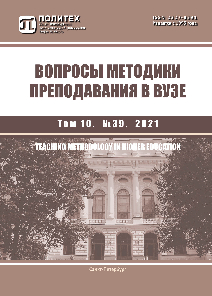Analysis of distance learning impact on technical students’ metacognitive self-regulation (with English language training course as an example)
This study examines the factors that influence students’ metacognitive strategies while taking distance learning courses in current epidemiological situation. It has been demonstrated that distance learning is characterised with autonomy. That is why students’ ability to self-regulate their learning becomes vital. This study is aimed at analysing the impact of distance learning on student’s metacognitive selfregulation in the process of studying a foreign language online under pandemic conditions. The research sample consisted of four first-year students' academic groups (86 students) from Peter the Great St. Petersburg Polytechnic University. To analyse the impact of distance learning on student’s metacognitive self-regulation we used a scale “Cognitive and Metacognitive Strategies: Metacognitive Self-Regulation” of the MSLQ Questionnaire. The Paired sample T-test revealed no statistically significant difference between the values Mean 1 (after a semester of on-campus teaching) and Mean 2 (after a semester of online teaching). However, the results demonstrate that the participants of the study became more aware of the strategies they use, improved some self-study skills and the ability to plan and organize the learning process. It was concluded that distance learning had a positive effect on the way students planned and evaluated their educational activities



